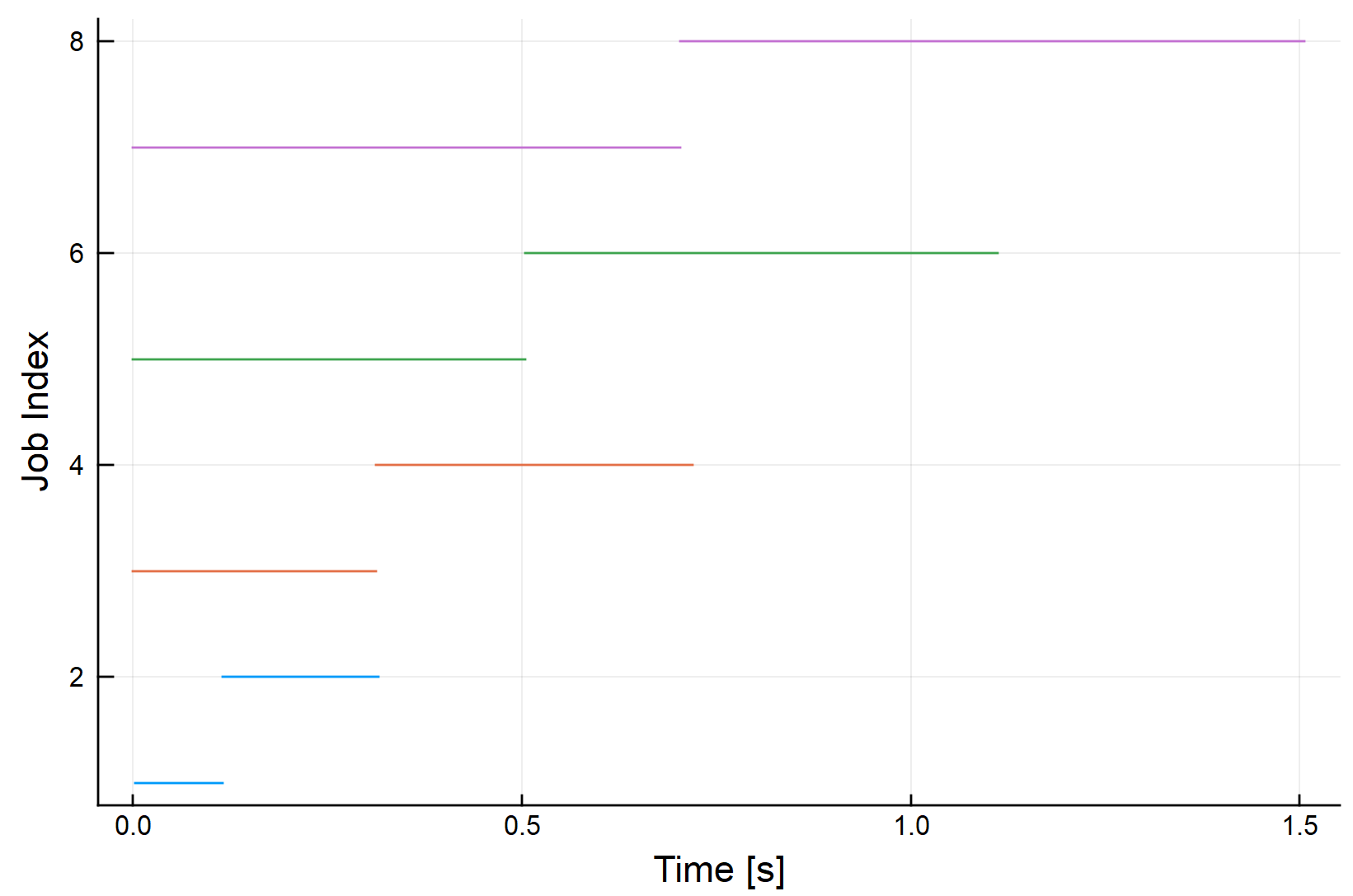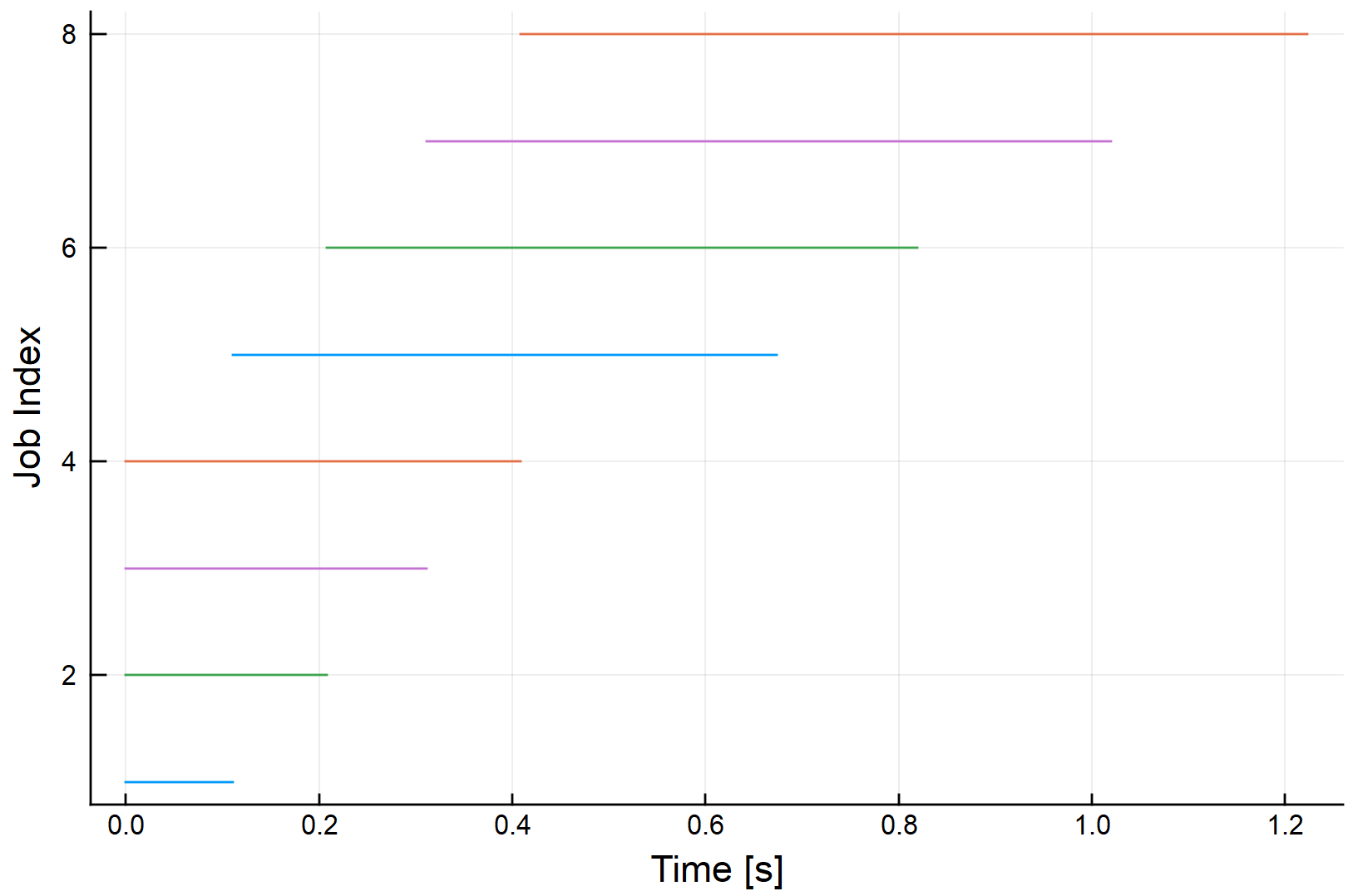Improved thread management for background and nonuniform tasks
Documentation at https://tro3.github.io/ThreadPools.jl
ThreadPools.jl is a simple package that exposes a few macros and functions
that mimic Base.Threads.@threads, Base.map, and Base.foreach. These
macros (and the underlying API) handle cases that the built-in functions are
not always well-suited for:
- A group of tasks that the user wants to keep off of the primary thread
- A group of tasks that are very nonuniform in duration
For the first case, ThreadPools exposes a @bthreads ("background threads")
macro that behaves identically to Threads.@threads, but keeps the
primary thread job-free. There are also related bmap and bforeach
functions that mimic their Base counterparts, but with the same non-primary
thread usage.
For the second case, the package exposes a @qthreads ("queued threads") macro.
This macro uses a different scheduling strategy to help with nonuniform jobs.
@threads and @bthreads first divide the incoming job list into equal job
"chunks", then launch each
chunk on a separate thread for processing. If the jobs are not uniform, this
can lead to some long jobs all getting assigned to one thread, delaying
completion. @qthreads does not pre-assign threads - it only starts a new
job as an old one finishes, so if a long job comes along, the other threads
will keep operating on the shorter ones. @qthreads itself does use the
primary thread, but its cousin @qbthreads uses the same strategy but in the background.
There are also qmap, qforeach, qbmap, and qbforeach.
The package also exposes a lower-level @tspawnat macro that mimics the
Base.Threads.@spawn macro, but allows direct thread assignment for users who
want to develop their own scheduling.
| Foreground (primary allowed) | Background (primary forbidden) | |
|---|---|---|
| Uniform tasks |
|
|
| Nonuniform tasks |
|
|
Each of the above macros comes with a logging version that allows the user to analyze the performance of the chosen strategy and thread count:
| Foreground | Background | |
|---|---|---|
| Uniform tasks |
|
|
| Nonuniform tasks |
|
|
Please see below for usage examples.
The above macros invoke two base structures, StaticPool and QueuePool, each of which can
be assigned to a subset of the available threads. This allows for composition with the
pwith and @pthreads command, and usage in more complex scenarios, such as stack
processing. See https://tro3.github.io/ThreadPools.jl for more detail.
Each of the simple API functions can be used like the Base versions of the
same function:
julia> @qbthreads for x in 1:3
println("$x $(Threads.threadid())")
end
2 3
3 4
1 2
julia> bmap([1,2,3]) do x
println("$x $(Threads.threadid())")
x^2
end
2 3
3 4
1 2
3-element Array{Int64,1}:
1
4
9
julia> t = @tspawnat 4 Threads.threadid()
Task (runnable) @0x0000000010743c70
julia> fetch(t)
4Note that the first two examples above use the background versions and no
threadid==1 is seen. Also note that while the execution order is not
guaranteed across threads, but the result of bmap will of course match
the input.
The logging versions of the above functions all produce an AbstractThreadPool
object that has an in-memory log of the start and stop times of each job that
ran through the pool. A PlotRecipe from RecipesBase is exposed in the
package, so all that is needed to generate a visualization of the job times is
the plot command from Plots. In these plots, each job is shown by index,
start time, and stop time and is given a color corresponding to its thread:
julia> using Plots
julia> pool = logtforeach(x -> sleep(0.1*x), 1:8);
julia> plot(pool)julia> pool = logqforeach(x -> sleep(0.1*x), 1:8);
julia> plot(pool)Note the two different scheduling strategies are seen in the above plots. The
tforeach log shows that the jobs were assigned in order: 1 & 2 to
thread 1, 3 & 4 to thread 2, and so on. The qforeach shows that each
job (any thread) is started when the previous job on that thread completes.
Because these jobs are very nonuniform (and stacked against the first
strategy), this results in the pre-assign method taking 25% longer.

